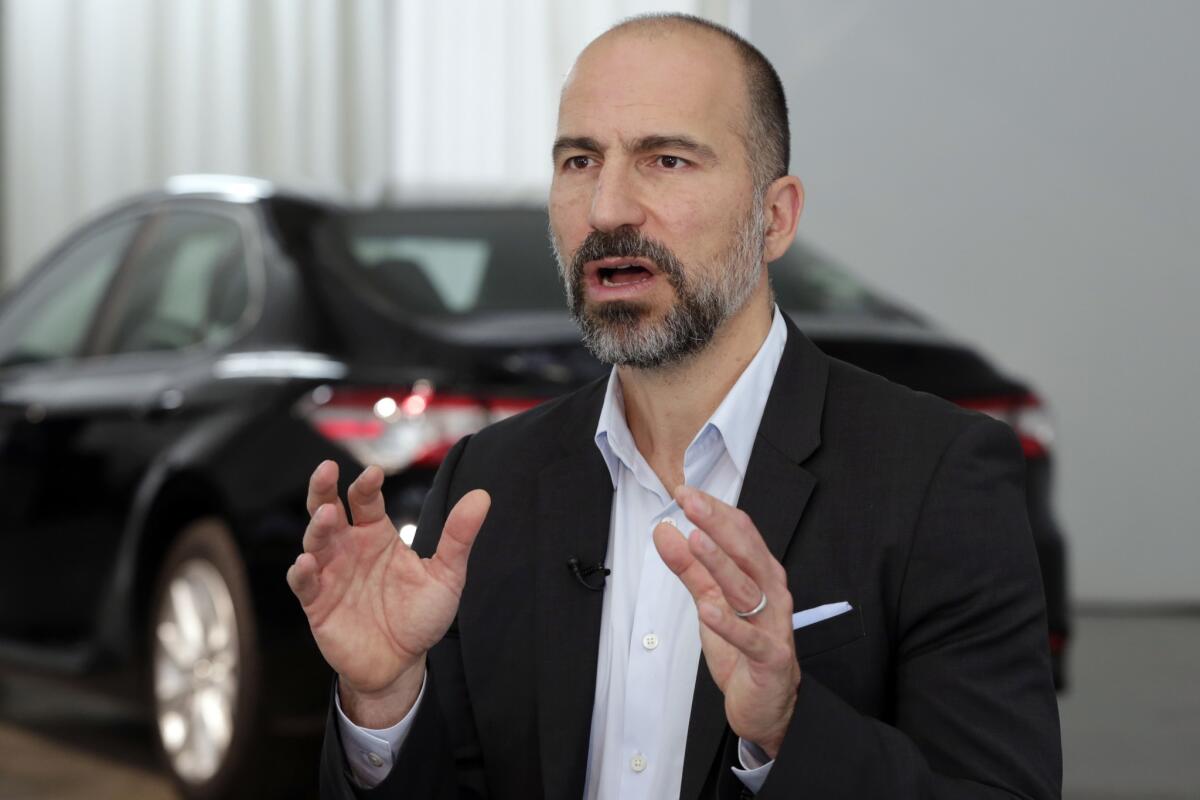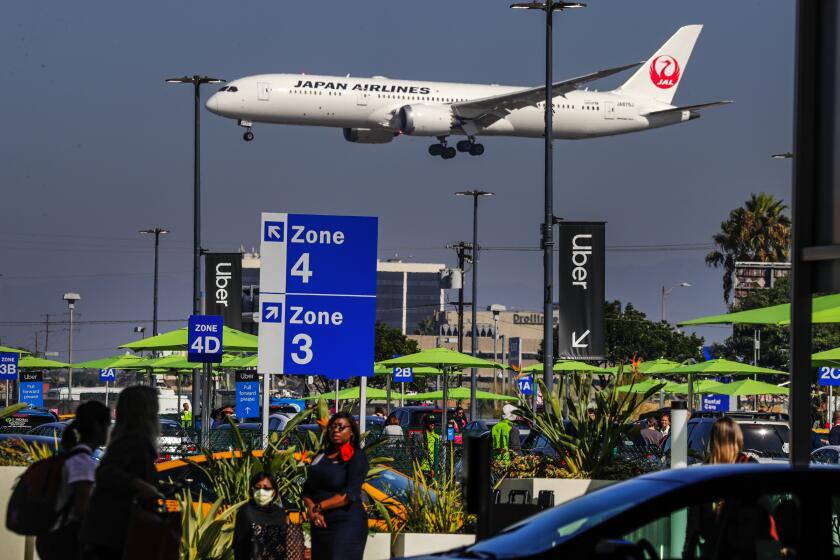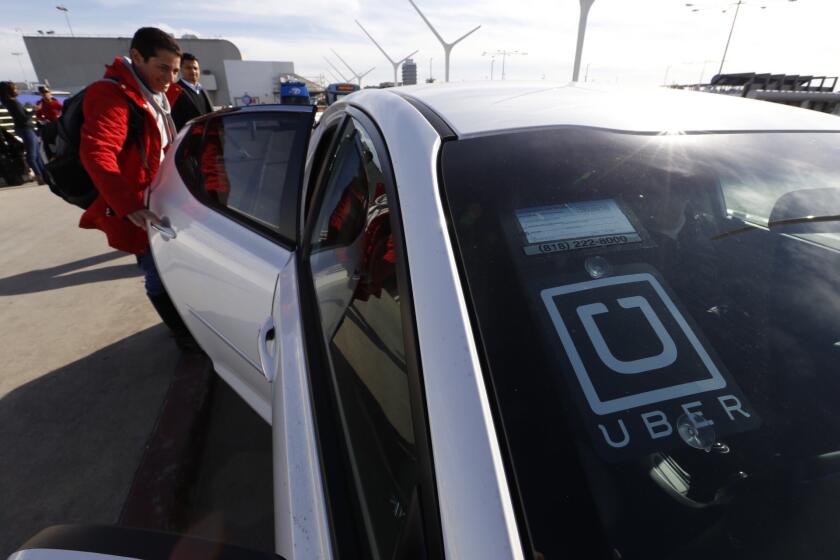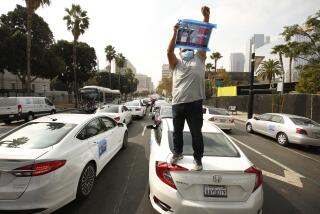Column: In a ruling protecting AB 5, a judge loses patience with Uber and Lyft ‘nonsense’

- Share via
The ride-hailing gig company Uber has made its way in this complex world largely by flouting local laws and denying to its drivers the benefits of formal employment.
Courts and regulators have been taking an increasingly skeptical view of these practices. Few, however, have questioned them as bluntly as San Francisco Superior Court Judge Ethan P. Schulman.
The judge on Monday ordered Uber and Lyft, its smaller ride-hailing competitor, to reclassify their drivers as employees rather than independent contractors. (He gave the firms 10 days to comply in case they wished to appeal.)
It is high time that they face up to their responsibilities to their workers and to the public.
— San Francisco Superior Court Judge Ethan P. Schulman, referring to Uber and Lyft
Schulman’s order could deal a heavy blow to the companies, which have said their business models depend on avoiding the costs of employment and sticking their drivers with such expenses as fuel, vehicle upkeep and insurance.
What’s especially notable about the order is the directness of Schulman’s language about the companies’ legal positions, which include the assertion that they’re not really in the transportation business — they just provide drivers and passengers with an app allowing them to hook up.
Schulman calls this argument “nonsense.” He says it “flies in the face of economic reality and common sense.” He notes “glaring inconsistencies” between the companies’ position and statements they’ve made in other courtrooms and other contexts. He accuses Uber and Lyft of a “prolonged and brazen refusal to comply with California law.”
He states, “It is high time that they face up to their responsibilities to their workers and to the public.”
This is not the first time that the companies have been taken to task in court or by government regulators. A federal judge quoted by Schulman accused them earlier this year of “thumbing their noses” at state legislators and regulators.
The California Public Utilities Commission, which had carved out a special regulatory designation for “transportation network companies,” informed the companies that as of last Jan. 1 their drivers “are presumed to be employees” and advised that the law requires them to provide the drivers with workers’ compensation benefits starting July 1.
Uber and Lyft are being squeezed by enforcement of California’s gig worker law.
But Schulman’s may be the sternest words laid against either of the companies since 2015, when Federal Judge Jed Rakoff of New York took Uber to task for allegedly lying in his court about a scheme to investigate a plaintiff who had sued its then-CEO, Travis Kalanick, for antitrust violations. Uber’s activities, Rakoff said then, raised “a serious risk of perverting the processes of justice before this court.”
Schulman’s order is important because Uber and Lyft will almost certainly be voicing the arguments heard in his court to the broader public in the next few months. They and other gig companies have spent more than $110 million, so far, to pass a California ballot initiative aimed at overturning AB 5. That’s the state law passed in 2019 that effectively requires them to classify their drivers as employees.
The order, as it happens, pertains to a lawsuit filed in May by California Atty. Gen. Xavier Becerra and the city attorneys of Los Angles, San Francisco and San Diego, seeking an injunction to force Uber and Lyft to comply with AB 5 by properly classifying their drivers as employees.
The companies sought to put the lawsuit on hold until a federal appeals court rules on their lawsuit to declare AB 5 unconstitutional and until the November election, when voters will rule on the ballot initiative, Proposition 22. Schulman denied the request.
Uber fired an early shot for Proposition 22 on Monday with an op-ed appearing in the New York Times under the name of Uber CEO Dara Khosrowshahi. The essay, however, largely rehearses familiar assertions by the companies, including that classifying drivers as employees would drive up passenger fares and deprive drivers of “flexibility” in setting their hours.
Khosrowshahi contends that the ballot initiative he’s sponsoring would require the companies to “provide new benefits” to drivers without designating them as employees.
We’ve already debunked these assertions. The “new benefits” provided under Proposition 22 would fall far short of the costs their drivers shoulder as independent contractors and result in guaranteed income for drivers well below minimum wage.
Khosrowshahi proposes in the op-ed that “gig economy companies be required to establish benefits funds which give workers cash that they can use for the benefits they want, like health insurance or paid time off....Had this been the law in all 50 states, Uber would have contributed $655 million to benefits funds last year alone.”
What he doesn’t say is that nothing prevents Uber from doing this without being forced to by law, just as nothing in AB 5 requires Uber or Lyft to deprive their drivers of flexible work hours. It’s the companies’ option.
Get ready for a torrent of special-interest spending on California ballot measures.
As for whether reclassifying drivers as employees will drive up fares, it’s certain that fares are destined to rise anyway. Uber lost $15.7 billion and Lyft $4.2 billion in the last three calendar years, including periods in which they were supported by venture capital firms; now they’re both public companies and public investors aren’t likely to be as indulgent about such torrential red ink.
AB 5 was designed to codify a 2018 California Supreme Court decision that made it much tougher for businesses to declare workers to be independent contractors rather than employees. The stakes are high in this conflict. Employees are entitled by law to a minimum wage, overtime, workers’ compensation, the right to form a union, and to protection by anti-discrimination and paid sick leave laws, among other benefits. “Independent contractors” are not.
That surely helps explain why the gig companies are desperate to overturn AB 5 or otherwise to win exemption from the law.
It’s proper to observe that The Times, along with other California newspapers, has been lobbying via the California News Publishers Assn. to extend for two years an exemption from AB 5 covering newspaper carriers, who have long been treated as independent contractors.
The Times is also supporting a measure that would loosen the restrictions AB 5 places on contributions by freelance writers, editors and photographers.
That brings us back to Schulman’s order. He shows particular contempt for the assertion by Uber and Lyft that they’re exempt from AB 5 because drivers aren’t central to the business the companies are in — they don’t actually hire drivers, the companies argue, but merely provide technology to people with cars so they can offer rides to people without cars. They’re just “matchmakers,” Uber told the judge.
We’re familiar with the Uber that talked about responding to bad publicity by digging up dirt on reporters following the company.
This is “nonsense,” Schulman writes. “To state the obvious, drivers are central, not tangential, to Uber and Lyft’s entire ride-hailing business.”
If every company chose to label itself a “technology” company as Uber tries to do, he adds, “the rapidly expanding majority of industries that rely heavily on technology could with impunity deprive legions of workers of the basic protections afforded to employees by state labor and employment laws.”
Nor does Schulman show much patience for the companies’ plea to put off enforcement of AB 5 until the voters weigh in on Proposition 22. If, as Becerra contends, the companies are violating the law, there’s no reason that “they should be given a pass to continue doing so to see if they can muster their considerable financial resources to persuade the voters to change the law in their favor.”
Schulman acknowledges that AB 5 imposes costs on the gig companies. But that’s the price of doing business, he finds, and the companies’ own actions have increased those costs: the “far-reaching effects” of the injunctions Becerra and the other regulators have sought “have only been exacerbated by [the companies’] prolonged and brazen refusal to comply with California law.”
They’ve already gotten a break, he notes. The companies should have been subjected to those costs starting two years ago, when the state Supreme Court made it plain that their drivers should be classified as employees. Instead, they set to “thumbing their noses” at state law.
As Schulman writes, judges are empowered to issue injunctions of the sort the state regulators sought when they can show they have a reasonable probability of winning their case in court. When it comes to the state’s argument that the companies are flouting state law, the regulators have shown not merely that they’re likely to win, but that there’s an “overwhelming likelihood” of victory.
Voters should keep those words in mind when they weigh the claims of Uber and Lyft in the voting booth. Their drivers are employees of Uber and Lyft “under any reasonable understanding of the English language,” Schulman writes. That should be the last word.
More to Read
Inside the business of entertainment
The Wide Shot brings you news, analysis and insights on everything from streaming wars to production — and what it all means for the future.
You may occasionally receive promotional content from the Los Angeles Times.













